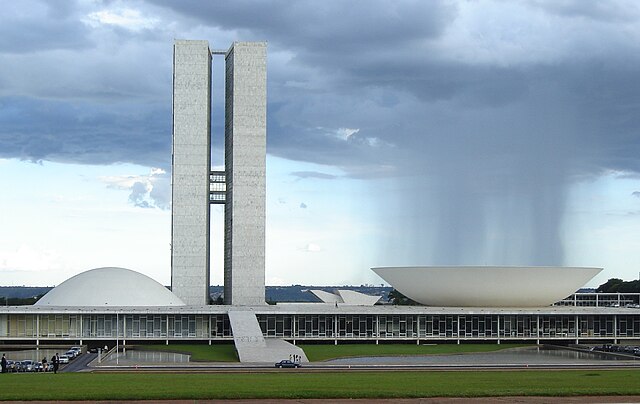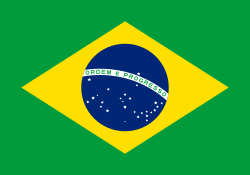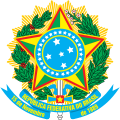Brazil
country in South America From Wikipedia, the free encyclopedia
Remove ads
Brazil, officially the Federative Republic of Brazil, is a country in South America. It is the world's fifth largest country. The country has about 212 million people. The capital of Brazil is Brasília. Brazil was named after brazilwood, which is a tree that once grew very well along the Brazilian coast.[7] Brazil has the most Portuguese speakers in the world and is the only country in the Americas where Portuguese is an official language.[8][9]

Remove ads
History
The first people to come to Brazil came around 9,000 B.C.[10] That group of indigenous people is often called the South American Indians and probably came from North America. They practiced hunting, foraging, and farming.[11] Over thousands of years, many different indigenous people were living there.

Pedro Álvares Cabral was the first European to see Brazil. He saw it in 1500. He was from Portugal and the Portuguese kingdom claimed Brazil. Soon, Portugal colonized Brazil and created colonies all along the coastline. They began to import black slaves from Africa and force them to work.[12] Because of the violence of the slave masters, many of these slaves would run away into the forest and create their own communities called quilombos.
In the late 1500s and early 1600s, the Dutch and the French tried to take some land in Brazil. Dutch, French, and Portuguese started moving inland further than the Treaty of Tordesillas said they could. This caused some fights with the Spaniards (people from Spain) and indigenous people in the area.[11]
In 1822, Brazil declared independence from Portugal. Soon there was civil war. Meanwhile, the quilombos survived and Brazil was bringing in more slaves than any other country in the Americas, even though many countries were beginning to legally abolish slavery. This led to an increase in slave revolts, especially in the 1860s and 1880s, which forced the government to change the system to keep the country stable.[13] Slavery was legally abolished in 1888.
In 1889, there was a military coup, and Pedro II had to leave the country.[11] In 1889, Brazil became a republic. The only people who could vote were people who owned land. There were some uprisings in the 1920s because some people thought the government was unfairly helping coffee growers. Brazil joined the Allies during World War II.[11]
During the 1960s, the military leader Castelo Branco overthrew the government and created a dictatorship that was supported by the United States.[14] It was very anti-communist and they imprisoned, tortured, or killed many people on the left.[14] Since then, the country has become more democratic, but some people feel that there are still big problems in health, education, crime, poverty and social inequality.
In August 2016, then-president Dilma Rousseff was removed from office because of impeachment.[15]
In the 2018 elections, the controversial conservative candidate Jair Bolsonaro of the Social Liberal Party (PSL) was elected president, winning in the second round against Fernando Haddad, of the Workers Party (PT), with the support of 55.13% of the valid votes.[16] In the early 2020s, Brazil became one of the hardest hit countries during the COVID-19 pandemic, receiving the second-highest death toll worldwide after the United States.[17] In May 2021, Luiz Inácio Lula da Silva said that he would run for a third term in the 2022 Brazilian general election against Bolsonaro.[18] In October 2022, Lula was in first place in the first round, with 48.43% of the support from the electorate, and received 50.90% of the votes in the second round.[19][20] On 8 January 2023, a week after Lula's inauguration, a mob of Bolsonaro's supporters attacked Brazil's federal government buildings in the capital, Brasília, after several weeks of unrest.[21][22]
Remove ads
Languages
The official language of Brazil is Portuguese. Brazil is the only country in South America that speaks Portuguese but more people in South America speak Portuguese than Spanish because the population of Brazil is larger than the combined population of all the Spanish-speaking countries in South America.
Some people in Brazil speak German dialects. That came from German immigrants. 2% of Brazilians speak German as their first language. Yiddish is spoken by the elders of the Jewish community.
Other people in Brazil speak their ancestors' languages like Italian, Japanese, Polish, Ukrainian, French, Russian, Lithuanian, Chinese, Dutch and Korean. Spanish or "Portunhol", a mix of Portuguese and Castilian (Spanish) is spoken at some of the borders. Indigenous languages as Guarani and Aymará are the first languages of a small number of Brazilians.
Remove ads
Geography
Brazil has the world's largest rainforest, the Amazon Rainforest. It makes up 40% of the country's land area. Brazil also has other types of land, including a type of savanna, called cerrado, and a dry plant region named caatinga.
The most important cities are Brasília (the capital), Belém, Belo Horizonte, Curitiba, Florianópolis, Fortaleza, Goiânia, Maceió, Manaus, Porto Alegre, Recife, Rio de Janeiro, Salvador, São Paulo (the biggest city) and Vitória. Other cities are at List of largest cities in Brazil.
Brazil is divided into 26 states plus the Federal District in five regions (north, south, northeast, southeast and centre-west):
- North: Acre, Amazonas, Rondônia, Roraima, Pará, Amapá, Tocantins
- Northeast: Maranhão, Pernambuco, Ceará, Piauí, Rio Grande do Norte, Paraíba, Alagoas, Sergipe, Bahia
- Centre-West: Goiás, Mato Grosso, Mato Grosso do Sul, Distrito Federal/ Federal District
- Southeast: São Paulo, Rio de Janeiro, Espírito Santo, Minas Gerais
- South: Paraná, Santa Catarina and Rio Grande do Sul
The country is the fifth-largest in the world by area. It is known for its many rainforests and jungles. It is next to every country in South America except Chile and Ecuador. The name Brazil comes from a tree named brazilwood.
Culture
Brazil is the largest country in South America and the fifth-largest in the world.[23] Its people are called Brazilians or Brasileiros (In Portuguese). The people include citizens of Portuguese or other European descent who mainly live in the South and Southeast, Africans, Native Americans, Arabs, Gypsies, and people of mixed ancestry. Brazil also has the largest Japanese community outside Japan.[24] Other East Asians follow the Japanese group. The Amazon River flows through Brazil, it is the 2nd longest river in the world (after the Nile). The current President of Brazil is Luiz Inácio Lula da Silva. Two major sporting events were held in Brazil recently: the 2014 FIFA World Cup and the 2016 Summer Olympics in Rio de Janeiro.
Remove ads
Sport
In 2016 Brazil became the first South America country to host the Summer Olympics.[25]
Related pages
References
Other websites
Wikiwand - on
Seamless Wikipedia browsing. On steroids.
Remove ads




